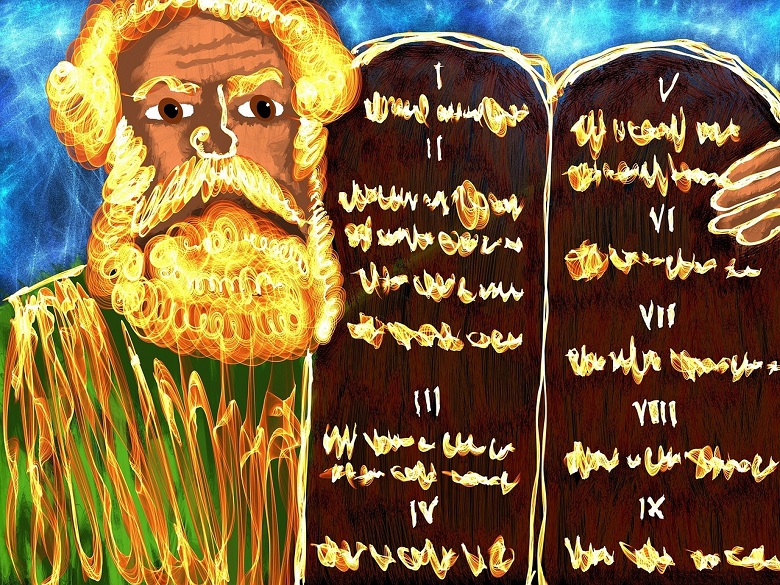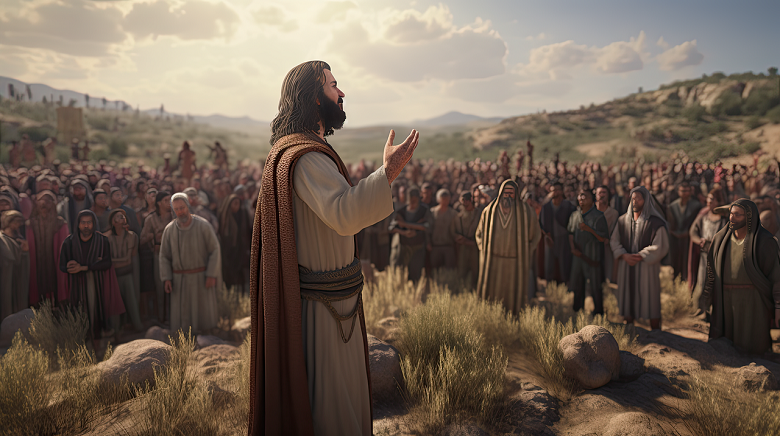
Everybody knows the Ten Commandments, right?
Well, maybe.
Some people will tell you that there are only two. Some will say there are not two, not ten, but 613 Commandments given by YHWH to his people, the Children of Israel.
If the Bible is to be the guide to faith and practice for the world’s Jews and Christians, why can’t we agree on what God’s word actually is?
Many people read the Bible for instructions on how to live. That’s what the Ten Commandments are for, or the two, or the 613.
As we approach these seeming discrepancies, we have to keep in mind that the Hebrew Bible we know today was written by men between c. 600 BCE and c. 450 BCE and the New Testament between c. 50 CE and c. 150 CE.
That means that the entire modern Holy Bible was compiled, edited and redacted in a period not exceeding 750 years, and translated over and over again in the centuries following. While the stories in the Torah and in the Prophets and in the Writings contained in the Hebrew Bible depict events that stretch back into our pre-historic past, it purports to elucidate the details of those ancient events even though The Torah was NOT written by Moses and the books of the Hebrew Bible did not exist before the Babylonian captivity.
We have no way of knowing who and how many men were engaged in the writing and compiling of the many books of the Bible. We have hundreds of ancient texts which contain fragments and complete books and 3000 years of interpretation by scribes, priests, theologians and a smattering of kings and emperors.
OK, so how many actual commandments are there?
If you are looking for a lucid answer, it is not to be found here. Instead, we will explore the various ways in which we can look at God’s Commandments.

The first commandment given by YHWH to a man is in the Book of Genesis, Chapter 2, verses 16 and 17:
16 And the Lord God commanded the man, saying, “You may surely eat of every tree of the garden, 17 but of the tree of the knowledge of good and evil you shall not eat, for in the day that you eat of it you shall surely die.”
This commandment, as we know, was immediately broken and mankind was banned from God’s garden and turned out into the world to live or die. His “sinful nature” caused him to rebel against God and we see further examples of that behavior all through the Hebrew Bible.
We might conclude that the commandment given in the Garden was rejected by man, creating the need for a complex set of laws or commandments.
In The Beginning, in the Book of Genesis, before what we call the “Ten Commandments” appear, we can find what are known as the Noahide Commandments. The basis of these is found in the Ninth Chapter of Genesis. They have been interpreted by rabbis in the Talmud to contain the following:
- Not to worship idols.
Not to curse God.
Not to commit murder.
Not to commit adultery or sexual immorality.
Not to steal.
Not to eat flesh torn from a living animal.
To establish courts of justice.
These commandments are not spelled out in specific terms in the text of the Bible but have been interpreted over a few thousand years by rabbis and scholars.
These commandments were followed by God’s people, right?
Following the episode of Noah, his family and the flood, the people once again rebelled against God and found themselves in bondage in the land of Egypt. They were delivered from Egypt by YHWH, working through the hand of his prophet, Moses.
This is where it gets tricky.
After YHWH delivers the Israelites from bondage in Egypt, they, as is their nature, rebel against God while Moses is on the mountain and begin to construct and worship a calf or bull made from all their gold jewelry.
You might wonder how these people who were most recently enslaved in Egypt got their hands on that much gold jewelry. You will never get a satisfactory answer. Just relax and follow the story.
At this point, Moses descends the mountain with two stone tablets on which YHWH has, with his own finger, written the “ten words” which have now come down to us as the Ten Commandments.
In Biblical Hebrew, the terms are translatable as “the ten words”, “the ten sayings”, or “the ten matters.”
They do not become the Ten Commandments until the printing of the Geneva Bible (1560), the Bishop’s Bible (1572) and the King James Bible (1611). They certainly were never called the Ten Commandments by YHWH.
So, those Ten Commandments become God’s Law and that is the end of it, right?
Not exactly.
It turns out that The Torah contains not ten but 613 specific laws that are given to the Children of Israel. These laws concern human relationships, diet, clothing, worship, sacrifice, the priesthood and a whole list of human activities.
The Books of the Torah spell out these laws in several of its books.
James Madison University has compiled, in the order that they appear in the Torah, the 613 laws (Hebrew: mitzvot) given by YHWH to the people through Moses, the prophet of YHWH. We will not list them all here. Many refer to the activities of the priests of the Temple. Many are impossible to keep in modern times. Many honestly seem silly. I will list here, a sample of God’s Commandments.
1. To know there is a God.
(Exodus 20:2)
2. To have not other gods.
(Exodus 20:3)
3. To know that He is one.
(Deuteronomy 6:4)
4. To love Him.
(Deuteronomy 6:5)
5. To fear Him.
(Deuteronomy 10:20)
6. To sanctify His Name.
(Leviticus 22:32)
7. Not to profane His Name.
(Leviticus 22:32)
8. To worship Him as He has ordered and not destroy holy objects.
(Deuteronomy 12:4)
13. To love your neighbor as yourself.
(Leviticus 19:18)
18. Not to oppress the weak.
(Exodus 22:21)19. Not to slander.
(Leviticus 19:16)20. Not to take revenge.
(Leviticus 19:18)21. Not to bear a grudge.
(Leviticus 19:18)27. Not to worship idols.
(Exodus 20:5)28. Not to bow down to idols.
(Exodus 20:5)29. Not to make an idol.
(Exodus 20:4)30. Not to make or cast an image.
(Leviticus 19:4)31. Not to make gods of silver or gold.
(Exodus 20:20)32. Not to turn a people to idolatry.
(Exodus 23:13)62. Not to engage in astrology.
(Leviticus 19:26)63. Not to say incantations or cast spells.
(Deuteronomy 18:11)64. Not to attempt contacting the dead.
(Deuteronomy 18:11)65. Not to consult with mediums.
(Deuteronomy 18:11)66. Not to converse with wizards.
(Deuteronomy 18:11)67. Not to do sorcery.
(Deuteronomy 18:10)110. Not to eat leaven all seven days of Passover.
(Exodus 13:3)111. Not to eat anything containing leaven during Passover.
(Exodus 12:20)112. No leaven shall be found in your domain during Passover.
(Exodus 13:7)113. Not to find any leaven in your house all seven days of Passover.
(Exodus 12:19)114. To eat matzoh on the first night of Passover.
(Exodus 12:18)139. Not to have relations with your mother.
(Leviticus 18:7)140. Not to have relations with your father’s wife.
(Leviticus 18:8)141. Not to have relations with your sister.
(Leviticus 18:9)142. Not to have relations with your father’s wife’s daughter.
(Leviticus 18:11)143. Not to have relations with your son’s daughter.
(Leviticus 18:10)144. Not to have relations with your daughter.
(Leviticus 18:10)145. Not to have relations with your daughter’s daughter.
(Leviticus 18:10)146. Not to marry a woman and her daughter.
(Leviticus 18:17)147. Not to marry a woman and her son’s daughter.
(Leviticus 18:17)148. Not to marry a woman and her daughter’s daughter.
(Leviticus 18:17)149. Not to have relations with your father’s sister.
(Leviticus 18:12)150. Not to have relations with your mother’s sister.
(Leviticus 18:13)151. Not to have relations with your father’s brother’s wife (same father).
(Leviticus 18:14)152. Not to have relations with your son’s wife.
(Leviticus 18:15)153. Not to have relations with your brother’s wife (same father and/or mother).
(Leviticus 18:16)154. Not to have relations with your wife’s sister.
(Leviticus 18:18)155. A man must not have relations with a beast.
(Leviticus 18:23)156. A woman must not have relations with a beast.
(Leviticus 18:23)600. Not to forget their atrocities and ambush on our journey from Egypt in the desert.
(Deuteronomy 25:19)601. Not to dwell permanently in Egypt.
(Deuteronomy 17:16)602. Offer peace terms to the residents of a city under siege and treat them according to the Torah if they accept surrender terms.
(Deuteronomy 20:10)603. Not to offer peace to Ammon and Moab while besieging them.
(Deuteronomy 23:7)604. Not to destroy fruit trees even during a siege.
(Deuteronomy 20:19)605. Prepare latrines outside the camps.
(Deuteronomy 23:13)606. Prepare a shovel for each soldier to dig with.
(Deuteronomy 23:14)607. Appoint a priest to speak to the soldiers during war.
(Deuteronomy 20:2)608. A newly married man who has built a home or planted a vineyard is exempt from the military to rejoice with his wife.
(Deuteronomy 24:5)
Clearly, these mitzvot are complex and difficult, if not impossible to keep in modern times. There are sects of Judaism who diligently attempt to keep these Commandments.
Modern American Jewish author A.J. Jacobs attempted to follow the 613 mitzvot for one year and wrote a hilarious book about the result.
He found that for a Jew living in our times, many of these commandments are simply out of date and time. Others refer to things that do not currently exist.
Why does this get dangerous?
In 2024, and picking up public steam since the 2016 presidential election in the U.S., certain adherents to specific protestant denominations and cults, have cherry-picked specific laws from among the 613 to parade before the public and the press and to accuse others who do not agree with “abomination” against the Lord.
To anyone who would condemn his brother or sister for abomination I would warn: do not let me catch you eating a bacon cheeseburger or of wearing man-made fabrics at the same time as wool cotton. Do not shave your face or trim your hair at the temples. Do not leave your home on a Saturday and most importantly, if a male in your home has not been circumcised, drag him screaming to the nearest synagogue to get it done immediately! All of these things are, according to scripture, abominations against the Lord.

What does Yeshua say about the Law?
In his article, Jesus and the Law, Protestant pastor and theologian, Jack Hendren outlines several passages from the Gospels regarding Yeshua’s discussions of the Law of Moses (the 613 mitzvot).
Early on in the Sermon on the Mount Jesus Christ said, “Do not think that I came to destroy the Law or the Prophets. I did not come to destroy but to fulfill” (Matthew 5:17). He asserted that not even something as small as an accent mark in the written law would be changed until heaven and earth pass away (verse 18)—and that is a long time!
Jesus continued, “Whoever therefore breaks one of the least of these commandments, and teaches men so, shall be called least in the kingdom of heaven; but whoever does and teaches them shall be called great in the kingdom of heaven” (verse 19).
And many still wonder today. Didn’t Jesus give a “new commandment”?
Here is what He said: “A new commandment I give to you, that you love one another; as I have loved you, that you also love one another. By this all will know that you are My disciples, if you have love for one another” (John 13:34-35).
Confusion begins when some conclude that demonstrating love somehow replaces keeping God’s law. These people apparently fail to understand that God’s law is a law of love.
Jesus explained that love can be expressed in two great commandments—love toward God and love toward your neighbor (Matthew 22:36-39).
Later Jesus explained that love can be expressed in two great commandments—love toward God and love toward your neighbor (Matthew 22:36-39).
The way we love God is explained by the first four commandments (Exodus 20:1-11). The way we love our neighbor is explained by the last six commandments (verses 12-17).
Thus, Jesus summarized the 10 Commandments under two great summary laws: love God and love your neighbor. Jesus did not teach that the 10 Commandments were done away but that they are grouped under two great laws.
Unfortunately, this does not add clarity to our confusion. All of this is still open to interpretation.
How can we sort this out?
It seems to me that we have to each of us, to interpret scripture as we see it. Without getting into deep theological and metaphysical complexity and confusion, I will say this:
If I were a Jew and believed that each point of the law is equally important, I would follow the 613 to the best of my ability
If I were a Jew who believed (like the rabbis teach) that the Torah is a guide and not a set of absolute rules, I would keep the mitzvot that make sense in 2024.
If I were a Christian, I would keep the laws specified by Yeshua: “Do not murder, Do not commit adultery, Do not steal, Do not bear false witness, Do not defraud, Honor your father and mother.” and the “Two Great Commandments:”
“‘Love the Lord your God with all your heart and with all your soul and with all your mind.’ 38 This is the first and greatest commandment. 39 And the second is like it: ‘Love your neighbor as yourself.’ 40 All the Law and the Prophets hang on these two commandments.”
There are, of course, priests, rabbis and preachers who will disagree and who will cherry-pick verses from the Hebrew Law.
My conclusion is this:
- The Bible is not clear on what laws are required. If you are an ancient Israelite, all 613 apply to you.
- If you are a modern Jew, you can interpret the Torah and the rabbinic literature for yourself.
- If you are a Christian and you believe yourself to be incapable of making your own decisions, seek the counsel of a clergyman.
- If, however, you are an intelligent Christian who can think for yourself (or an agnostic), I would recommend that you do just that. For Biblical guidance, I would first recommend Matthew 22:36-40.
- If you are an atheist, you need not bother, but you cannot go wrong with Matthew 22:36-40 either.
And go forth in the knowledge that NO MAN can legitimately condemn you for your beliefs.














